《The Libido for the Ugly》浅析
《The Libido for the Ugly》浅析
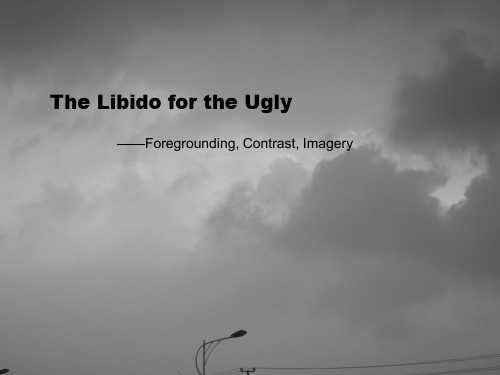
Foregrounding
Contrast
可译为对照。用比较不同或相反性质的办法来加以区分 (distinguish or be distinguished by comparison of unlike or opposite qualities)
对照是将两种事物(或情形)放在一起就某一性质进行 比较,以显现其反差。
a peculiar writing skill; outline an image of pathological eccentricity(病 态怪癖), very thought-provoking.
Foregrounding
可译为前景突出或突出,一种修辞手法。突出本身是一个暗 喻,将文学语言比成了绘画或摄影。 在绘画或摄影中,人物往往摆在比较突出的地位,而花鸟山 水等自然景观被用作图画背景。这样,不但画面和谐,而且主 从有致。置于突出地位的部分引人注目,背景部分则起着烘云 托月的作用。 语言也是这样。一般来说,语言以其常规的方式为说话者所 使用,为听话者所接受。但语言的使用往往超出常规(norm), 或故意偏离(deviation),或刻意求工(regularity)。但不 论用哪种形式,都会起到引人注目的作用。这种超出常规的语 言称为被突出的语言(foregrounded language),而人们惯常 使用的常规语言则被看成背景语言(backgrounded language)。
The-Libido-for-the-Ugly-讲义PPT课件
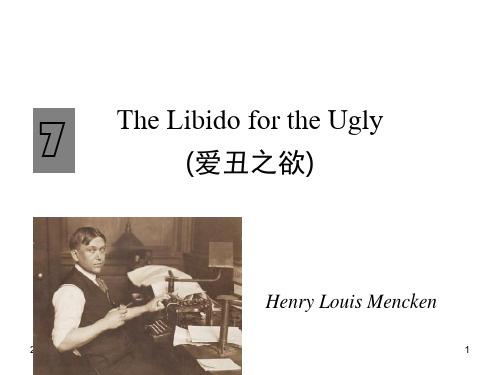
2021/7/24
10
Mencken’s Writing Style
• No other entertainment gave him greater pleasure than reporting from the conventions; nor did anyone appreciate his efforts more than Mencken himself. One reporter, peering through Mencken's window late at night after one rally, recalled watching him at work alone in his hotel room, pounding out copy on a typewriter propped on a desk. He would type a few sentences, read them, slap his thigh, toss his head back, and roar with laughter. Then he would type some more lines, guffaw, and so on until the end of the article.
Edgar Allan Poe (埃德加·爱伦·坡 )
3
Henry Louis Mencken (1880-1956)
• Born in Baltimore • Privately educated there • Graduated from Baltimore Polytechnic Institute
该影评为翻译

该影评为翻译。
《海洋之歌》算不上我最中意的电影,但它在某些瞬间打动了我,这种忽隐忽现的感动促使我写这篇影评,这些瞬间是关于真实人生的艰苦和难熬的,主要体现在了两个配角身上,也是这部电影“反派”:女巫玛查与她的儿子麦克·利尔。
写光明童话的影评总是这样艰难,我无法确信光明真的存在,在人生大部分的时空里,我们主要做的就是对抗黑暗:世界给予的黑暗、考验与内心的脆弱和失衡。
黑暗是我们真实的处境,是我们真正所处的时空。
《海洋之歌》是一部表面看起来光明简单的童话,关于一群濒危灭绝的精灵,关于它们逐渐被控制和被城市化吞噬的生活;但在光芒与诗意的表面,我依然捕捉到这部电影那一丝黑暗与凉意、人的垂死挣扎和对命运的无力反抗,玛查与她儿子的绝望——就是这一丝微妙的黑暗对整部电影进行了非凡的折射与对比,使这部动画电影变得并非表面那么简单,它反射出了这个故事本身所具备的多角度的生活哲思和光怪陆离的人生作为。
它不仅仅讲述一个靠一首歌和一件外套就能战胜世界的童话,也不仅仅局限于孩童天马行空的白日梦,它指向了我们生活中那些不可避免的痛苦与挫折,我们该如何与这些重要情绪与经历相处,相处方法本身成为了一种哲学和智慧,也成为一种缺少选择的选择。
巨人麦克利尔失去了他非常重要的一个人,他悲痛万分,日夜哭泣,泪水汇成了黑色的海洋。
爱人的失去犹如被推倒的多米诺骨牌,它引发了一个家族的沦陷与枯萎。
他的母亲女巫玛查(有没有人发现玛查各方面都跟宫崎骏《千与千寻》里的汤婆婆很像?导演自称也是宫老的粉丝)心如刀绞,却无法拯救他于这悲痛,她于是用魔法吸取了他的悲伤和哭泣,把他变成了一尊巨大暗沉的石像。
石像是没有情感的,因此就没有了悲伤,这样麦克就不会再伤害自己了,他可以日夜麻木地这样站着海水里,不再哭泣也不再发声,风吹日晒,直到生命被悄然耗尽。
女巫玛查法力无边,但她也无法替代儿子的命运,惟有攫取他的感情来阻止他悲痛。
这是一种对生活过分和过度的控制和操纵,没有人能彻底控制得了生活和命运,玛查却在努力做到这一点,过度的控制令人麻木僵死、成为石头,这本身就是对控制的无声反抗与讽刺。
高级英语Lesson5修辞The Libido for the Ugly
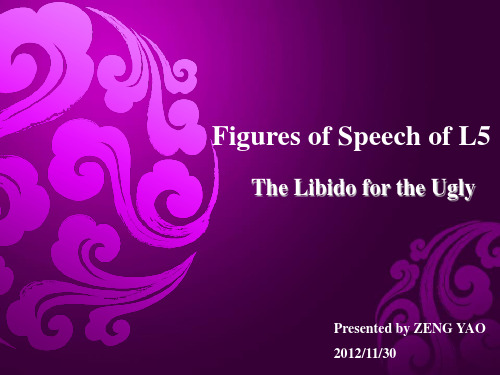
Theme: The innate love of ugliness in US is a pathological(病态的) problem. dreadful, hideous, bleak, appalling,
forlorn, revolting, macabre, monstrousness, leprous, misshapen, dingy, loathsome, obscene, putrid, ghastly, leprous, uremic, eczematous
Inversion
Parallelism
repetition
transferred epithet
Synecdoche 提喻 Rhetorical question
Speech Contents
Hyperbole in L5
superlative
(Para 1) “the boast and pride of the richest and grandest nation ever seen on earth” (Para 1) “Here was wealth ….disgraced a race of ally cats.(流浪猫)”
Emphasizing
Definition of Hyperbole :
A deliberate use of overstatement or exaggeration to achieve emphasis.
Hyperbole in L5:
They amplify both prosperity and ugliness of Westmoreland, which provoke the curiosity and imagination of readers.
the libido for the ugly爱丑之欲
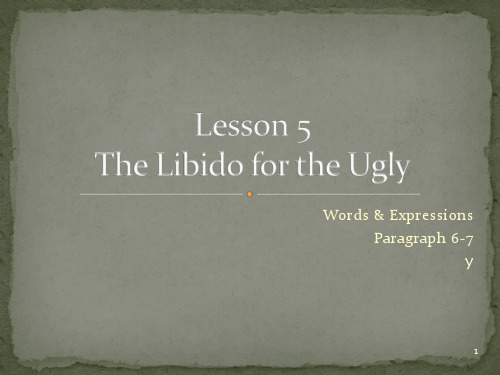
to deface a bond 注销债券 to deface the record 抹去录音
8
It is impossible to put down the wallpaper that defaces the average American home of the lower middle class to mere inadvertence, or to the obscene humor of the manufactures. (para.7)
先生!你的话简直是无礼。
5
It is incredible that mere ignorance should have achieved such masterpieces of honor. (para.6)
mere Used when you are saying that a particular thing is enough to have an influence on that situation. masterpiece (n.) an extremely good painting, novel, film, or other work of art, an outstanding achievement
柯赛特已经习惯于自己的离奇费解的命运。
12
The taste for them is as enigmatical and yet as common as the taste for dogmatic theology and the poetry of Edgar A. Guest. (para.7) dogmatic theology 教条神学 Dogmatic (adj.) being certain that your beliefs are right and refuse to consider that other opinions might also be justified. In summary, dogmatic attitudes about each of these approaches should be avoided if they are to be combined.
The-Libido-for-the-Ugly-讲义PPT课件

H. L. Menken’s Great Concerns
• He hated narrowed-minded religions and strongly supported intellectual freedom. He fought with every effort to maintain the independence of literature. He felt the greatest threat of literature was the country’s prevailing religion “fundamentalism”, the opinions of which were based on the literary interpretation of the Bible.
8
Mencken’s Writing Style
• “I opened A Book of Prejudices and began to read. I was jarred and shocked by the style, the clear, clean, sweeping sentences. Why did he write like that? And how did one write like that? I pictured the man as a raging demon, slashing with his pen. I read on and what amazed me was not what he said, but how on earth anybody had the courage to say it…I identified myself with that book.” -----Richard Wright 9
The Libido for the Ugly 课件讲义
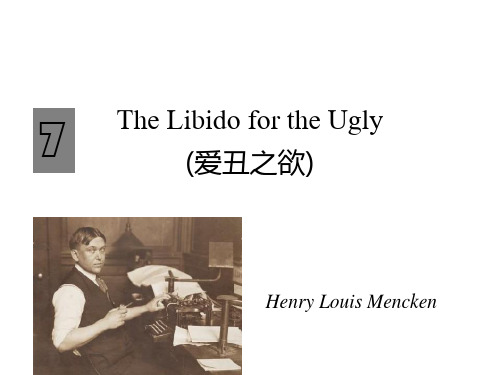
reality essentially by specific and concrete words that
appeal to the reader’s sense of sight, smell, sound, taste and touch.
What is the order of organization for a description?
exert “democracy” wisely.
Mencken’s Writing Style
• “I opened A Book of Prejudices and began to read. I
was jarred and shocked by the style, the clear, clean,
7
The Libido for the Ugly
(爱丑之欲)
Henry Louis Mencken
Outline of Class Teaching
• An introduction to Henry Louis Mencken His early life and career His writing style
James Lowell (詹姆斯· 洛威尔)
Edgar Allan Poe (埃德加· 爱伦· 坡)
Henry Louis Mencken (1880-1956)
• Born in Baltimore
• Privately educated there
• Graduated from Baltimore Polytechnic Institute
What is a description?
• Description conveys the sensations, emotions and impressions that affect a writer experiencing a person,
The Libido for the Ugly 课件讲义

British and American English and to define the distinguishing characteristics of American English. Mencken’s groundbreaking study was undoubtedly the most scientific linguistic work on the American language to date and continues to serve as a definitive resource in the field.
Henry Louis Mencken (1880-1956)
• Born in Baltimore • Privately educated there • Graduated from Baltimore Polytechnic Institute
Henry Louis Mencken (1880-1956)
• In his witty and satirical essays, he mocked the institution which supported the middle class. He enjoyed, met and challenged his antagonists with his direct and devastating attacks.
Mencken’s Contributions to the American Language
• Editor, social critic, and longtime journalist with The Baltimore Sun, Mencken inspired many young writers in the 1920s. And though he died more than half a century ago, his rip-roaring, witty, combative, yet graceful style continues to "stir up the animals" and attract fresh admirers.
门肯《爱丑之欲》的写作特点解析
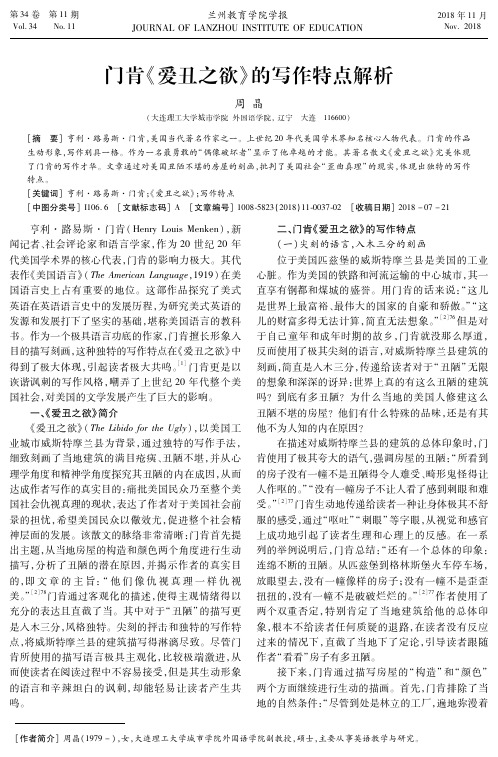
门肯《爱丑之欲》的写作特点解析周晶(大连理工大学城市学院外国语学院,辽宁大连116600)[摘 要]亨利·路易斯·门肯,美国当代著名作家之一。
上世纪20年代美国学术界知名核心人物代表。
门肯的作品生动形象,写作别具一格。
作为一名最勇敢的“偶像破坏者”显示了他卓越的才能。
其著名散文《爱丑之欲》完美体现了门肯的写作才华。
文章通过对美国丑陋不堪的房屋的刻画,批判了美国社会“歪曲真理”的现实,体现出独特的写作特点。
[关键词]亨利·路易斯·门肯;《爱丑之欲》;写作特点[中图分类号]I106.6 [文献标志码]A [文章编号]1008 5823(2018)11 0037 02 [收稿日期]2018-07-21 亨利·路易斯·门肯(HenryLouisMenken),新闻记者、社会评论家和语言学家,作为20世纪20年代美国学术界的核心代表,门肯的影响力极大。
其代表作《美国语言》(TheAmericanLanguage,1919)在美国语言史上占有重要的地位。
这部作品探究了美式英语在英语语言史中的发展历程,为研究美式英语的发源和发展打下了坚实的基础,堪称美国语言的教科书。
作为一个极具语言功底的作家,门肯擅长形象入目的描写刻画,这种独特的写作特点在《爱丑之欲》中得到了极大体现,引起读者极大共鸣。
[1]门肯更是以诙谐讽刺的写作风格,嘲弄了上世纪20年代整个美国社会,对美国的文学发展产生了巨大的影响。
一、《爱丑之欲》简介《爱丑之欲》(TheLibidofortheUgly),以美国工业城市威斯特摩兰县为背景,通过独特的写作手法,细致刻画了当地建筑的满目疮痍、丑陋不堪,并从心理学角度和精神学角度探究其丑陋的内在成因,从而达成作者写作的真实目的:痛批美国民众乃至整个美国社会仇视真理的现状,表达了作者对于美国社会前景的担忧,希望美国民众以儆效尤,促进整个社会精神层面的发展。
TheLibidofortheUgly解读
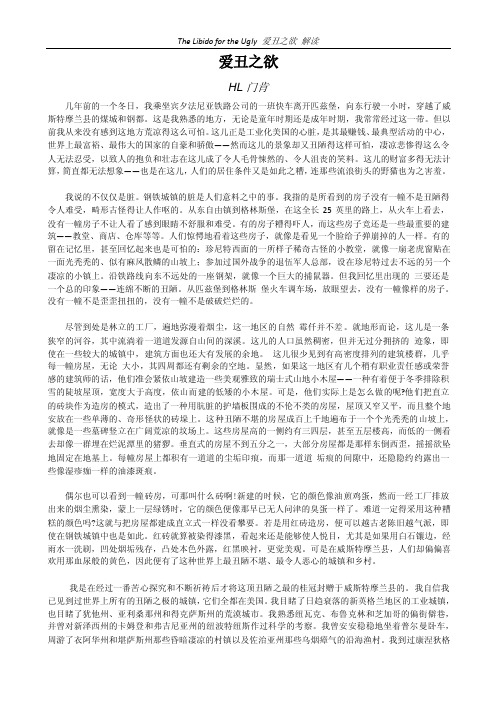
爱丑之欲HL门肯几年前的一个冬日,我乘坐宾夕法尼亚铁路公司的一班快车离开匹兹堡,向东行驶一小时,穿越了威斯特摩兰县的煤城和钢都。
这是我熟悉的地方,无论是童年时期还是成年时期,我常常经过这一带。
但以前我从来没有感到这地方荒凉得这么可怕。
这儿正是工业化美国的心脏,是其最赚钱、最典型活动的中心,世界上最富裕、最伟大的国家的自豪和骄傲——然而这儿的景象却又丑陋得这样可怕,凄凉悲惨得这么令人无法忍受,以致人的抱负和壮志在这儿成了令人毛骨悚然的、令人沮丧的笑料。
这儿的财富多得无法计算,简直都无法想象——也是在这儿,人们的居住条件又是如此之糟,连那些流浪街头的野猫也为之害羞。
我说的不仅仅是脏。
钢铁城镇的脏是人们意料之中的事。
我指的是所看到的房子没有一幢不是丑陋得令人难受,畸形古怪得让人作呕的。
从东自由镇到格林斯堡,在这全长25英里的路上,从火车上看去,没有一幢房子不让人看了感到眼睛不舒服和难受。
有的房子糟得吓人,而这些房子竞还是一些最重要的建筑——教堂、商店、仓库等等。
人们惊愕地看着这些房子,就像是看见一个脸给子弹崩掉的人一样。
有的留在记忆里,甚至回忆起来也是可怕的:珍尼特西面的一所样子稀奇古怪的小教堂,就像一扇老虎窗贴在一面光秃秃的、似有麻风散鳞的山坡上;参加过国外战争的退伍军人总部,设在珍尼特过去不远的另一个凄凉的小镇上。
沿铁路线向东不远处的一座钢架,就像一个巨大的捕鼠器。
但我回忆里出现的三要还是一个总的印象——连绵不断的丑陋。
从匹兹堡到格林斯堡火车调车场,放眼望去,没有一幢像样的房子。
没有一幢不是歪歪扭扭的,没有一幢不是破破烂烂的。
尽管到处是林立的工厂,遍地弥漫着烟尘,这一地区的自然霉仟并不差。
就地形而论,这儿是一条狭窄的河谷,其中流淌着一道道发源自山间的深溪。
这儿的人口虽然稠密,但并无过分拥挤的迹象,即使在一些较大的城镇中,建筑方面也还大有发展的余地。
这儿很少见到有高密度排列的建筑楼群,几乎每一幢房屋,无论大小,其四周都还有剩余的空地。
The Libido for the Ugly 爱丑之欲

The Libido for the UglyH. L. Mencken1 On a Winter day some years ago, coming out of Pittsburgh on one of the expresses ofthe Pennsylvania Railroad, I rolled eastward for an hour through the coal and steel towns of Westmoreland county. It was familiar ground; boy and man, I had been through it often before. But somehow I had never quite sensed its appalling desolation. Here was the very heart of industrial America, the center of its most lucrative and characteristic activity, the boast and pride of the richest and grandest nation ever seen on earth--and here was a scene so dreadfully hideous , so intolerably bleak and forlorn that it reduced the whole aspiration of man to a macabre and depressing joke . Here was wealth beyond computation, almost beyond imagination--and here were human habitations so abominable that they would have disgraced a race of alley cats.2 I am not speaking of mere filth. One expects steel towns to be dirty. What I allude to is the unbroken and agonizing ugliness, the sheer revolting monstrousness, of every house in sight. From East Liberty to Greensburg, a distance of twenty-five miles, there was not one in sight from the train that did not insult and lacerate the eye. Some were so bad, and they were among the most pretentious --churches, stores, warehouses, and the like--that they were down-right startling; one blinked before them as one blinks before a man with his face shot away. A few linger in memory, horrible even there: a crazy little church just west of Jeannette, set like a dormer-window on the side of a bare leprous hill; the headquarters of the Veterans of Foreign Wars atanother forlorn town, a steel stadium like a huge rattrap somewhere further down the line. But most of all I recall the general effect--of hideousness without a break. There was not a single decent house within eye range from the Pittsburgh to the Greensburg yards. There was not one that was not misshapen, and there was not one that was not shabby.3 The country itself is not uncomely, despite the grime of the endless mills. It is, in form, a narrow river valley, with deep gullies running up into the hills. It is thickly settled, but not: noticeably overcrowded. There is still plenty of room for building, even in the larger towns, and there are very few solid blocks. Nearly every house, big and little, has space on all four sides. Obviously, if there were architects of any professional sense or dignity in the region, they would have perfected a chalet to hug the hillsides--a chalet with a high-pitched roof, to throw off the heavy Winter snows, but still essentially a low and clinging building, wider than it was tall. But what have they done? They have taken as their model a brick set on end. This they have converted into a thing of dingy clapboards with a narrow, low-pitched roof. And the whole they have set upon thin, preposterous brick piers . By the hundreds and thousands these abominable houses cover the bare hillsides, like gravestones in some gigantic and decaying cemetery. On their deep sides they are three, four and even five stories high; on their low sides they bury themselves swinishly in the mud. Not a fifth of them are perpendicular . They lean this way and that, hanging on to their bases precariously . And one and all they are streaked in grime, with dead and eczematous patches of paint peeping through the streaks.4 Now and then there is a house of brick. But what brick! When it is new it is the color of a fried egg. When it has taken on the patina of the mills it is the color of an egg long past all hope or caring. Was it necessary to adopt that shocking color? No more than it was necessary to set all of the houses on end. Red brick, even in a steel town, ages with some dignity. Let it become downright black, and it is still sightly , especially if its trimmings are of white stone, with soot inthe depths and the high spots washed by the rain. But in Westmoreland they preferthat uremic yellow, and so they have the most loathsome towns and villages ever seen by mortal eye.5 I award this championship only after laborious research and incessant prayer. I have seen, I believe, all of the most unlovely towns of the world; they are all to be found in the United States. I have seen the mill towns of decomposing New England and the desert towns of Utah, Arizona and Texas. I am familiar with the back streets of Newark, Brooklyn and Chicago, and have made scientific explorations to Camden, N. J. and Newport News, Va. Safe in a Pullman , I have whirled through the g1oomy, Godforsaken villages of Iowa and Kansas, andthe malarious tidewater hamlets of Georgia. I have been to Bridgeport, Conn., and to Los Angeles. But nowhere on this earth, at home or abroad, have I seen anything to compare to the villages that huddle aloha the line of the Pennsylvania from the Pittsburgh yards to Greensburg. They are incomparable in color, and they are incomparable in design. It is as if some titanic and aberrant genius , uncompromisingly inimical to man, had devoted all the ingenuity of Hell to the makingof them. They show grotesqueries of ugliness that, in retrospect ,become almost diabolical.One cannot imagine mere human beings concocting such dreadful things, and one can scarcely imagine human beings bearing life in them.6 Are they so frightful because the valley is full of foreigners--dull, insensate brutes, with no love of beauty in them? Then why didn't these foreigners set up similar abominations in the countries that they came from? You will, in fact, find nothing of the sort in Europe--save perhaps in the more putrid parts of England. There is scarcely an ugly village on the whole Continent. The peasants, however poor, somehow manage to make themselves graceful and charming habitations, even in Spain. But in the American village and small town the pull is always toward ugliness, and in that Westmoreland valley it has been yielded to with an eagerness bordering upon passion. It is incredible that mere ignorance should have achieved such masterpieces of horror.7 On certain levels of the American race, indeed, there seems to be a positive libido for the ugly, as on other and less Christian levels there is a libido for the beautiful. It is impossible to put down the wallpaper that defaces the average American home of the lower middle class tomere inadvertence , or to the obscene humor of the manufacturers. Such ghastly designs, it must be obvious, give a genuine delight to a certain type of mind. They meet, in some unfathomable way, its obscure and unintelligible demands. The taste for them is as enigmatical and yet as common as the taste for dogmatic theology and the poetry of Edgar A Guest.8 Thus I suspect (though confessedly without knowing) that the vast majority of the honest folk of Westmoreland county, and especially the 100% Americans among them, actually admire the houses they live in, and are proud of them. For the same money they could get vastly better ones, but they prefer what they have got. Certainly there was no pressure upon the Veterans of Foreign Wars to choose the dreadful edifice that bears their banner, for there are plenty of vacant buildings along the trackside, and some of them are appreciably better. They might, in- deed, have built a better one of their own. But they chose that clapboarded horror with their eyes open, and having chosen it, they let it mellow into its present shocking depravity. They like it as it is: beside it, the Parthenon would no doubt offend them. In precisely the same way the authors of therat-trap stadium that I have mentioned made a deliberate choice: After painfully designing and erecting it, they made it perfect in their own sight by putting a completelyimpossible penthouse painted a staring yellow, on top of it. The effect is that of a fat woman witha black eye. It is that of a Presbyterian grinning. But they like it.9 Here is something that the psychologists have so far neglected: the love of ugliness for its own sake, the lust to make the world intolerable. Its habitat is the United States. Out of the melting pot emerges a race which hates beauty as it hates truth. The etiology of this madness deserves a great deal more study than it has got. There must be causes behind it; it arises and flourishes in obedience to biological laws, and not as a mere act of God. What, precisely, are the terms of those laws? And why do they run stronger in America than elsewhere? Let some honest Privat Dozent in pathological sociology apply himself to the problem.(from Reading for Rhetoric by Caroline Shrodes,Clifford A, Josephson, James R. Wilson )NOTES1. the Veterans of Foreign Wars: generally abbreviated to VFW, an organization created by the merger in 1914 of three societies of United States overseas veterans that were founded after the Spanish-American War of 1899. With its membership vastly increased after World War Ⅰand World WarⅡ, the organization became a major national veterans' society.2. Guest: Edgar Albert Guest (1881--1959), English-born newspaper poet, whose daily poem in the Detroit Free Press was widely syndicated and extremely popular with the people he called'folks' for its homely, saccharine morality3. Parthenon: a beautiful doric temple built in honor of the virgin (Parthenos) goddess Athena on the Acropolis in Athens around 5th century B. C.4. Presbysterian: a form of church government by presbyters developed by John Calvin and other reformers during the 16th-century Protestant Reformation and used with variations by Reformed and Presbyterian churches throughout the world. According to Calvin's theory of church government, the church is a community or body in which Christ only is head and members are equal under him. All who hold office do so by election of the people whose representatives they are.Mencken assumes that Presbyterians are puritanical, sombrefaced people who never smile or laugh. Hence people are shocked by the unexpected and incongruous sight of a Presbyterian grinning.。
(完整版)the_libido_for_the_ugly讲解解读

A piece of subjective, impressionistic or emotional description
Description
Description is painting a picture in words of a person, place, object and scene.
Description
It conveys the sensations, emotions and impressions. The writer describes what he sees, hears, smells, feels or tastes, and it often includes his emotional reactions.
Lesson Seven
-- H.L. Mencken
Aims
1. To acquaint students with subjective
description writing.
2. To help students to understand the
author’s real intention behind the description.
Author --Henry Louis Mencken
(1880--1956) American educator, author, critic
Henry Louis Mencken
TheLibidofortheUgly分析
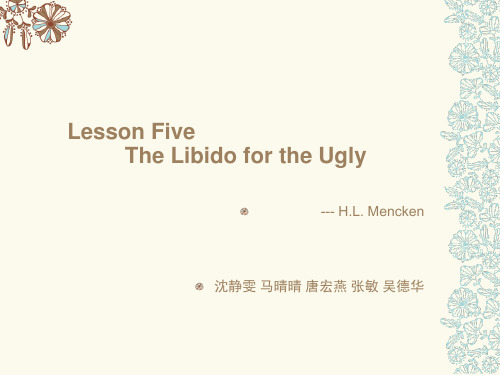
Learning Contents
1. Henry Louis Mencken 2. Description 2. Detailed study of the text 3. Organizational pattern 4. Language features 5. Exercises
Henry Louis Mencken
1) He hated narrow-minded religion. He believed strongly in intellectual freedom and fought all attempts to censor literature and drama. He felt that the greatest threat of censorship came from the country's religion "fundamentalists", whose opinions were all based on their interpretation of the Bible.
Henry Louis Mencken
A few years later, he joined the staff of its rival newspaper, the Baltimore Sun or Evening Sun, first as a reporter, then as its drama critic and editor, a position which he held until 1941.
Time allocation
1. Background information 2. Detailed study of the text 3. Structure analysis 4. Language appreciation 5. Exercises
爱丑之欲第6-7段解析

绝不能将破坏一Leabharlann 美国中下层阶级家庭装饰 美感的墙纸,归咎于选购者的疏忽大意,也 不能归咎于制造商的有伤风化的玩笑。
• The taste for them is as enigmatical and yet as common as the taste for dogmatic theology and poetry of Edgar A. Guest
Figures of speech (Para. 7)
Antithesis--on certain levels of the America race, indeed, there seems to be a positive libido for the ugly, as on other and less Christian levels there is a libido for the beautiful.
• It is hard to believe that people built such horrible houses just because they did not know what beautiful houses were like.
Border upon • Be very much like • The proposal borders upon the absurd 该提议似乎荒唐可笑
paraphrase
Libido for the ugly – libido for the beautiful ---
People in certain strata (social classes or division) of American society seem definitely to hunger after ugly thins, which in other less Christian strata, people seem to long for thins beautiful.
丑小鸭英语绘本读后感
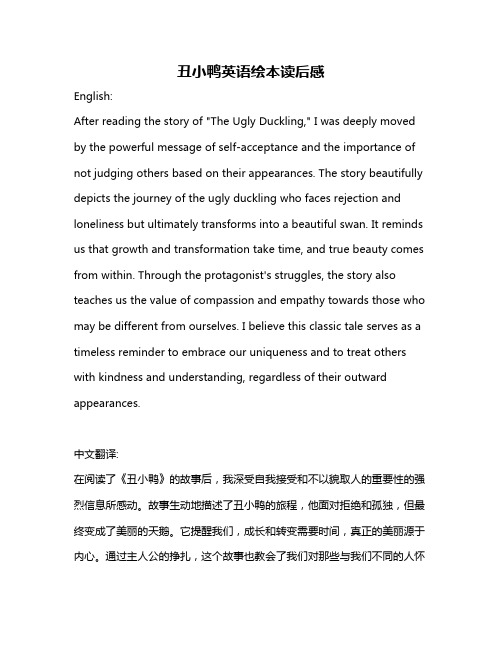
丑小鸭英语绘本读后感English:After reading the story of "The Ugly Duckling," I was deeply moved by the powerful message of self-acceptance and the importance of not judging others based on their appearances. The story beautifully depicts the journey of the ugly duckling who faces rejection and loneliness but ultimately transforms into a beautiful swan. It reminds us that growth and transformation take time, and true beauty comes from within. Through the protagonist's struggles, the story also teaches us the value of compassion and empathy towards those who may be different from ourselves. I believe this classic tale serves as a timeless reminder to embrace our uniqueness and to treat others with kindness and understanding, regardless of their outward appearances.中文翻译:在阅读了《丑小鸭》的故事后,我深受自我接受和不以貌取人的重要性的强烈信息所感动。
怪手杖丑丑走出红房子读后感

怪手杖丑丑走出红房子读后感英文回答:After reading "The Ugly Stick Comes out of the Red House," I was deeply moved by the powerful storytelling and thought-provoking messages conveyed in the story. The author skillfully weaves together elements of fantasy and reality, creating a captivating narrative that kept me engaged from beginning to end.The story revolves around the protagonist, the Ugly Stick, who lives in a red house. Despite its unattractive appearance, the Ugly Stick possesses a unique power to transform ugliness into beauty. This power serves as a metaphor for the transformative nature of love and acceptance. Through the Ugly Stick's journey, the story explores themes of self-acceptance, inner beauty, and the importance of embracing one's flaws.One of the aspects that struck me the most was theauthor's vivid descriptions. The red house, with its peeling paint and creaky floors, came to life in my imagination. The author's attention to detail created arich and immersive reading experience. Additionally, the characters were well-developed and relatable. I found myself empathizing with the Ugly Stick and rooting for its success throughout the story.Furthermore, the story's underlying messages resonated with me on a personal level. It reminded me of the importance of embracing our imperfections and finding beauty in unexpected places. The Ugly Stick's ability to transform ugliness into beauty serves as a reminder that our flaws and differences are what make us unique and special.Overall, "The Ugly Stick Comes out of the Red House" is a beautiful and thought-provoking story. It encourages readers to look beyond appearances and embrace the true essence of individuals. The powerful storytelling and meaningful messages make it a must-read for anyone seeking inspiration and a reminder of the beauty that lies withinus all.中文回答:《怪手杖丑丑走出红房子》一书让我深受感动,故事中强大的叙事能力和引人思考的信息令人印象深刻。
(全英文论文)浅析《巴黎圣母院》中的美与丑
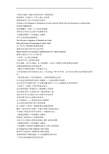
书面语言输入与输出对英语词汇习得的影响狄更斯在《双城记》中的人道主义思想新课标指导下的中学英语语法教学A Study of Fu Donghua’s Translation of Gone with the Wind from the Perspective of Rewriting时政新词翻译探析浅析隐藏在“面纱”之后的伯莎梅森身体语言在跨文化交际中的重要作用《玻璃动物园》中的逃避主义解读高中生英语阅读策略研究The Pervasive Agitation of Humbert in LolitaMan-and-Nature Relationship in Moby-Dick从《红字》看霍桑的道德思想观论跨文化交际中的中西文化冲突Major Barriers in Listening Comprehension of College Students教师在英语自主学习中的作用《圣经》与人类文明起源《纯真年代》女性意识探析虽不起眼,但不可或缺:从《洛丽塔》中的小人物看亨伯特悲剧的必然性从概念隐喻看寓言的语篇连贯《献给艾米丽的玫瑰》中的象征主义公布英语题目均有原创英文论文可交流Q:799 75 79 38 论中西方法律文化价值取向的差异《夜访吸血鬼》中克劳迪娅这一人物的悲剧命运分析从目的论角度看英语电影片名翻译——以基本颜色词为例论艾萨克巴什维斯辛格《卢布林的魔术师》中主人公雅夏犹太身份的探寻《永别了,武器》中的自然象征意义改写理论视角下看葛浩文《狼图腾》的英译从后殖民女性主义视角分析《他们眼望上苍》浅析合作学习在英语专业口语教学中的应用从童话看中西方儿童教育的差异从卡明斯的L(a 看视觉诗的可译潜势从文化的角度审视中西习语的来源论《简爱》中伯莎﹒梅森的象征意蕴和影响解析《麦田里的守望者》中帽子和鸭子的象征意义中美脱口秀会话分析对比研究(开题报告+论)《玻璃动物园》中的逃避主义解读爱伦坡《泄密的心》的恐怖效果从高中生生理和心理的角度探讨PPT使用的利弊《玻璃动物园》中的逃避主义解读《红楼梦》汉译英对话翻译过程中人物个性的保留A Comparison of the English Color Terms影响学生阅读的主要障碍及其解决策略美国情景剧《摩登家庭》中言语幽默的语用分析广告语中预设触发语的语用分析A Comparison of English Vocabulary Learning Strategy Use in Learners of Different Ages从女性个人主义角度分析《罗密欧与朱丽叶》女性人物性格特征关联理论视角下幽默的英汉翻译《恋爱中的女人》欧秀拉和古迪兰的性格对其爱情观的影响欧亨利《警察与赞美诗》中的黑色幽默英美电视剧中双关语的字幕翻译《霍乱时期的爱情》中象征手法的解析报刊广告英语的文体特色分析浅谈礼貌策略在商务谈判中的应用论《红字》中海丝特的女性身份重构《德伯家的苔丝》苔丝和《红字》海斯特的悲剧命运的比较论中西文化中家庭观念的差异英汉基本姿势动词(立、坐、躺)的语义实证比较研究从《动物庄园》看乔治·奥威尔反极权主义思想论商标名称的翻译对品牌形象的影响沃尔特·惠特曼及其诗歌研究苔丝悲剧原因探究爱丽斯沃克小说《紫色》的妇女主义话语从对等角度研究公示语翻译广告语及标语动词的翻译《到灯塔去》的意识流分析浅析《献给艾米莉的玫瑰》中渐渐消失的玫瑰从亚历克斯哈利《根》看非裔美国人寻根史金融英语的规范性及翻译策略研究从认知的角度来看主动语态在商务信函中的语用功能A Study on Strategies of Effective Teaching in the Junior Middle School EFL Classroom文化差异对中美商务谈判的影响A Comparison of Chinese and American Food CulturesAn Interpretation of China Boy from the Perspective of Post-colonialismA Popular Form of Subtitles Translation by Fansub Group on the Internet从生态女性主义角度解读《苔丝》对非英语专业大学生英语自主学习能力的调查家庭对汉尼拔和维托科利昂的性格特征影响分析从《了不起的盖茨比》看美国梦幻灭的必然性Sexism in English LanguageOn the Factors Leading to Different Destinies of Rhett Butler and Ashley Wilkes in Gone with the Wind中西酒文化比较从目的论角度看英语电影字幕的汉译策略英语单位名词研究——以《牛津高阶英汉双解词典(第六版)》为例爱伦坡短片小说“美女之死”主题研究英语广告的修辞及其翻译Psychological Analysis of Stuttering in The King’s Speech英汉颜色词隐喻的认知比较与研究中西文化差异在广告创意中的影射探讨宗教在世界战争史中所扮演的角色简述托马斯哈代和苔丝悲剧命运的原因信用证中英语语言特点及应用研究意译在广告英语翻译中的重要性探析论广告英语的语言特色尤金·奥尼尔戏剧中的父亲形象地方名胜古迹汉译英翻译研究An Analysis of Racism in Of Mice and Men李清照词英译研究钱钟书翻译研究从大学校训看中西方大学文化差异化妆品广告的语用预设分析论价值观对中美商务谈判的影响非言语交际在英语教学中的作用中英文新闻标题的差异威廉·福克纳作品中的不称职母亲英语专业学生语音学习中的问题天鹅的涅槃——以跨文化交际的角度解读《喜福会》中母女关系从《唐顿庄园》看一战对英国庄园经济文化的影响从审美视角分析中国古典诗词的英译《老人与海》中马洛林形象的不可或缺性A Comparison of the English Color Terms从《嘉莉妹妹》看德莱塞的女性观Application of TPR Teaching Method in Facilitating Pupils' English Vocabulary Learning 接受美学视角下的英汉音译研究从奈达翻译理论初探英汉新闻导语翻译策略Comparison and Translation of Chinese and English Tourism Texts论美国黑人地位的改变《智血》中主要人物生命历程解读(开题报告+论)英语新闻标题的文体特点与翻译浅析《麦田里的守望者》中的部分重要象征物中外教师教学体态语的意义差异研究数字的文化内涵及数字的翻译英汉灾难性新闻导语写作手法初探从翻译美学探究散文英译一位《飘》不去的女性—《飘》中斯佳丽的女性主义性格特点成长分析被忽视的主人公——析《简爱》中的疯女人从关联理论的角度看英语广告中隐喻的翻译分析《雾都孤儿》中的讽刺手法建构主义学习理论在中学英语教学中的应用从电影《七宗罪》看‘七宗罪’与基督教传统的关系商务英语合同的词汇特征《纯真年代》女性意识探析浅析美国高等教育的创新《紫色》中“家”的解读从以目的为导向的翻译原则看委婉语的翻译论《瓦尔登湖》的生态伦理意蕴金融危机对中美人民经济生活造成不同影响的文化根源论《简爱》中的经济意识通过电视广告看中美思维模式差异中国民俗词语汉译英初探广告翻译中的模因传播论初中生英语学习资源策略培养中西方餐桌礼仪的文化对比分析浅析广州-ELEVEN的经营模式及其发展前景探析《越狱》中Michael的性格特征及成因论杰克•凯鲁亚克《在路上》中的嬉皮士形象论教师的非语言行为在课堂教学中的作用中世纪的典雅爱情:本质、渊源和影响论接受理论对儿童文学作品的影响——以《快乐王子》中译本为例What Made Her Yield to the Reality—An Analysis of Sue in Jude the Obscure欲望与死亡——对马丁伊登的精神分析论《宠儿》中社区与逃离的关系试析诗歌翻译中文化意象的处理从奥巴马访华报道看中美媒体报道差异Risk Comparing of Documentary Collection and Letters of Credit从文化角度分析《论语》中特殊词语的翻译——以“仁”为个例Discourse, Immigrants and Identity in In the Skin of a LionPragmatic Failures in Translation of C-E Advertisements美国俚语的社会文化特征从目的论看林语堂《浮生六记》翻译中增译法的运用中西方婚姻观差异从鹿鼎记和唐吉诃德的主要人物的较对比来比中西方侠文化从“鱼”浅谈中西文化差异论劳伦斯《儿子与情人》中瓦尔特莫雷尔悲剧的成因浅析隐藏在“面纱”之后的伯莎梅森论海勒《第二十二条军规》小人物生存模式English Teaching and Learning in China's Middle SchoolOn the Translation of Psychological Description in Wuthering Heights from the Perspective of Functional Equivalence从《刮痧》看中美家庭文化差异英语新闻中委婉语的社会功用论中西文化中家庭观念的差异论《双城记》中的批判现实主义解析凯特肖班的《觉醒》中的哥特因素:浅析维多利亚时期妇女文学的觉醒从《一个干净明亮的地方》解析海明威的冰山理论哥伦布和郑和航海的对比研究——两次航海所反映出的中西方文化差异《欲望号街车》中布兰奇的悲剧成因分析试析邓恩《别离辞节哀》中圆规与圆的意象《红楼梦》两个译本中称呼语翻译的对比研究自然会话中会话结构的分析英汉道歉语对比研究合作学习理论在中学英语课堂中的应用毕业论文]比较《荆棘鸟》和《金锁记》小说中女性婚姻爱情悲剧原因英语课堂中的教师提问策略对比评析《了不起的盖茨比》中尼克和盖茨比的梦想A Comparison between Scarlett O’Hara and Jane Eyre from the Perspective of Feminism 世纪以来英汉委婉语的语义变迁Study of Translating Skills of Business Correspondence从文化角度探析品牌名称的翻译方法英语习语非稳定性结构特征研究A New View of Feminism in The Mill on the Floss River《紫色》的妇女主义解读从自然主义视角审视《嘉莉妹妹》中小人物嘉莉的命运抗争与幻灭对圣经文学性之赏析中国人和美国人特征的比较An Analysis of Characterization of O-lan in The Good EarthCoincidences and Images in The Mayor of Casterbridge, Tess of the D’Urbervilles《呼啸山庄》和它的四个版本电影的比较研究中美大学生道歉策略对比研究论《傲慢与偏见》中简奥斯丁的女性意识电影《海上钢琴师》的浪漫主义解读。
- 1、下载文档前请自行甄别文档内容的完整性,平台不提供额外的编辑、内容补充、找答案等附加服务。
- 2、"仅部分预览"的文档,不可在线预览部分如存在完整性等问题,可反馈申请退款(可完整预览的文档不适用该条件!)。
- 3、如文档侵犯您的权益,请联系客服反馈,我们会尽快为您处理(人工客服工作时间:9:00-18:30)。
END.
malarious (para.5)
dead (para.3)
putrid (para.6)
etiology (para.9)
Hell (para.5)
“the libido for the ugly” is not the foible of average persons, but the eccentricity of the sick, the dead and the decaying body.
The Libido for the Ugly
——Foregrounding, Contrast, Imagery
apply impression technique(印象手法) use many derogatory words & derogatory imagery. a blend of foregrounding, contrast and imagery
They two combines, “the libido for the ugly”, violating linguistic norms. The contrast is so intense that catches the readers' attention.
Foregrounding
Imagery
可译为意象,是一种使用语言的艺术手法。
赋义予诗歌或其他文学作品中提及的感官感受到的 一切物体和性质,其提及方式可以是文字描述、暗示 或比照物(如用于明喻和暗喻中的喻体)
the title "The Libido for the Ugly" is very arresting. People may ask:
the image of a dead man(病人意象)
the image of a decaying body(病人意象)
leprous (para.2)
cemetery (para.3)
decaying (para.3)
eczematous (para.3)
bury (para.3)
decomposing (para.5)
➢Why to use "the libido", but not "the love"? ➢Why to use "the the ugly", but not "for the beautiful"?
ቤተ መጻሕፍቲ ባይዱ
By using "the libido" that usually used in psychoanalysis is a deviation. "for the ugly" is used out of the same purpose.
On this ground, "the libido for the ugly" is not the foible of labourers, but the eccentricity of industrialists and industrial America. It is a pathological eccentricity.
derogatory(贬义) commendatory(褒义)
appalling dreadfully desolation disgrace hideous intolerably alley cat reduce bleak
forlorn macabre depressing
abominable
Westmoreland
Westmorelanders
industrial heart lucrative center rich boast grand pride aspiration
industrial America American industrialists
Contrast
the image of a sick person(病人意象)
Contrast
可译为对照。用比较不同或相反性质的办法来加以区分 (distinguish or be distinguished by comparison of unlike or opposite qualities)
对照是将两种事物(或情形)放在一起就某一性质进行 比较,以显现其反差。
a peculiar writing skill; outline an image of pathological eccentricity(病 态怪癖), very thought-provoking.
Foregrounding
可译为前景突出或突出,一种修辞手法。突出本身是一个暗 喻,将文学语言比成了绘画或摄影。 在绘画或摄影中,人物往往摆在比较突出的地位,而花鸟山 水等自然景观被用作图画背景。这样,不但画面和谐,而且主 从有致。置于突出地位的部分引人注目,背景部分则起着烘云 托月的作用。 语言也是这样。一般来说,语言以其常规的方式为说话者所 使用,为听话者所接受。但语言的使用往往超出常规(norm), 或故意偏离(deviation),或刻意求工(regularity)。但不 论用哪种形式,都会起到引人注目的作用。这种超出常规的语 言称为被突出的语言(foregrounded language),而人们惯常 使用的常规语言则被看成背景语言(backgrounded language)。
Imagery
In conclusion, the existence of the eccentricity has its deep social roots.
Through the intense contrast between "industrial America" and "Westmoreland", "American Industrialists" and "Westmorelanders", we can see that the prosperous industrial America is based on depriving the surplus value of the labourers.
